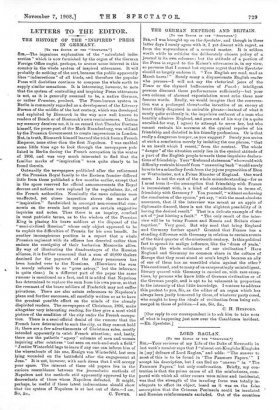THE GERMAN EMPEROR AND BRITAIN.
[To THE Eurrogt. or THE "SPECTATOR-`] was brought up on the Spectator, and though in these latter days I rarely agree with it, I yet dissent with regret, as from the waywardness of a revered master. It is seldom worth while to criticise the deliberately chosen policy of a journal in its own columns ; but the attitude of a portion of the Press in regard to the Kaiser's utterances is, in my view, so perverse that I cannot but express regret that the Spectator should so largely endorse it. " You English are mad, mad as March hares !" Surely many a dispassionate English reader who peruses—I will not say the rhetorical jeers of the Times or the rhymed buffooneries of Punch ; intelligent persons discount these performances sufficiently—hut your own column of alarmed expostulation must echo these now famous words. Really, we would imagine that the conversa- tion was a prolonged threat—the invective of an enemy at heart thinly disguised in amicable phrase—instead of what it surely quite evidently is, the impulsive outburst of a man who heartily admires England, and goes out of his way (in a quite uncalled-for way, I agree) to attempt to serve her, but who cannot restrain his soreness at the cynical repulse of his friendship and disbelief in his friendly professions. Or is that really a dangerous temper, as you suggest ? Surely you arrive at such a conclusion merely by isolating the one phrase, "that is an insult which I resent," from the context. The whole " danger" of the situation surely lies in the cynical attitude of a part of the English people towards these impulsive declara- tions of friendship. Your "firebrand statesman" who would with difficulty restrain himself from " answering back " would surely have to be a schoolboy fresh from the jejune pugnacities of Eton or Westminster, not a Prime Minister of England. One word more. Is not the root of the whole misunderstanding—for so I must term it—the assumption that friendship with France is inconsistent with, is a kind of contradiction in terms of, friendship with Germany ? You yourself, " without endorsing the conclusion of the cynics," yet say, " with the most absolute assurance, that if the interview was meant as an apple of diplomatic discord, there is not the slightest possibility of it having the desired result." That is a delicate example of the art of "just hinting a fault." "The only result of the inter- view will be to bring France and Russia and Britain closer together." Very good. But why need that bring England and Germany further apart? Granted that France has a standing difference with Germany in relation to certain events of the third quarter of the nineteenth century. Is this political fact to spread its malign influence, like the "dram of yeale,'. through the whole substance of our civilisation ? Have England and Germany no common share in the culture of Europe that they must stand at arm's length because an ally of one of them has an unsettled claim against the other ? This continued, and to many of us exasperatingly unintelligent, literary quarrel with Germany is carried on, with rare excep- tions, by persons who know little of German civilisation or of the German people, and is apt to be vehement in proportion to the intensity of that little knowledge. I venture to address this protest to you, Sir, as the editor of an organ which line always been justly honoured by those, of whatever party creed, who sought to keep the ideals of civilisation from being sub- merged in those of politics.—I am, Sir, &a., C. H. HERFORD. [Our reply to our correspondent is to ask him to take note of what is happening just uow over the Casablanca incident. —ED. Spectator.] -




























































 Previous page
Previous page